Michigan Law faculty are leaders in their disciplines, which run the gamut from business law to blood feuds. Apart from their teaching and research, the Law School’s faculty also are prolific and diverse writers, as evidenced by recent publications.
From gender relations and Nazi thefts to evidence and ancient Rome, recent faculty publications reflect the authors’ respective areas of expertise and interests.
And from seminal reference books to philosophical treatises to a fictional page-turner, they all demonstrate the linguistic versatility of our faculty.
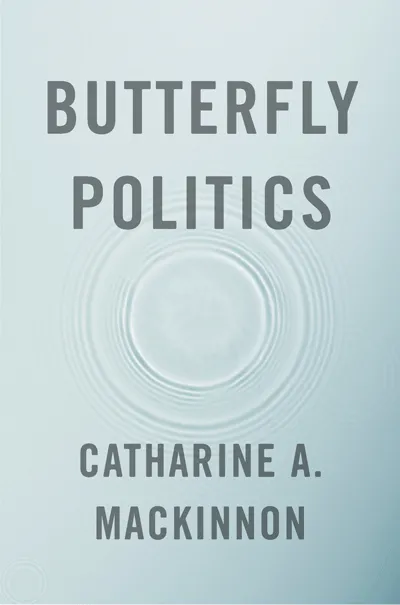
Butterfly Politics
(Belknap Press, 2017)
Catharine A. MacKinnon, Elizabeth A. Long Professor of Law
The minuscule motion of a butterfly’s wings can trigger a tornado half a world away, according to chaos theory. Under the right conditions, small, simple actions can produce large, complex effects. Similarly, MacKinnon argues that the right seemingly minor interventions in the legal realm can have a butterfly effect that generates major social and cultural transformations.
Butterfly Politics brings this incisive understanding of social causality to a wide-ranging exploration of gender relations. The pieces collected here—many published for the first time—provide a new perspective on MacKinnon’s career as a pioneer of legal theory and practice and an activist for women’s rights. Its central concerns of gender inequality, sexual harassment, rape, pornography, and prostitution have defined MacKinnon’s intellectual, legal, and political pursuits for more than 40 years. Though differing in style and approach, the selections all share the same motivation: to end inequality, including abuse, in women’s lives. A powerful critique of the legal and institutional denial of reality that perpetuates practices of gender inequality, Butterfly Politics provides a model of what principled, effective, socially conscious engagement with law looks like.
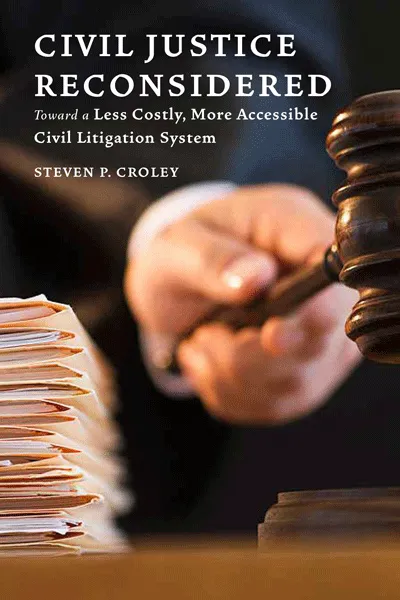
Civil Justice Reconsidered: Toward a Less Costly, More Accessible Litigation System
(New York University Press, 2017)
Steven P. Croley, Harry Burns Hutchins Collegiate Professor of Law
Civil Justice Reconsidered explores civil litigation in the United States. In it, Croley finds the system mostly beneficial because it is accessible to those who have suffered legal wrongs. However, critics call civil litigation deeply flawed, alleging the system is too expensive to help those who have really suffered while rewarding undeserving litigants. While Croley agrees there are problems with the system, he also points out how it serves society. As to the flaws, Croley proposes reforms that could increase access to the courts while reducing costs. This book provides an overview of the system and offers insight into why better litigation matters because of what is at stake for real people. It speaks to all the stakeholders, including those wanting to reform litigation: lawyers, judges, and legislators.
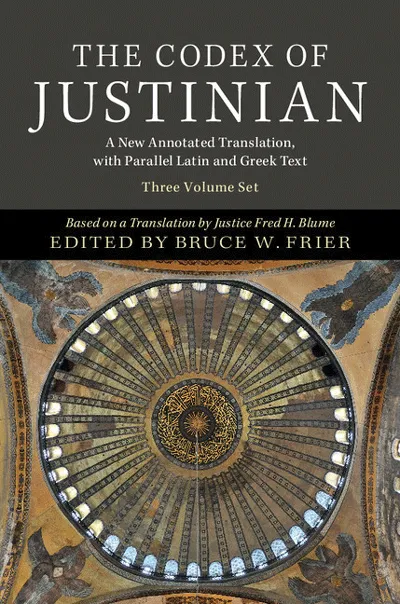
The Codex of Justinian 3 Volume Hardback Set: A New Annotated Translation, with Parallel Latin and Greek Text
(Cambridge University Press, 2016)
Bruce W. Frier, John and Teresa D’Arms Distinguished University Professor of Classics and Roman Law, and general editor of the three volumes (based on a translation by Justice Fred H. Blume of the Wyoming Supreme Court)
In the sixth century, Emperor Justinian I ordered the codification of Roman law to ensure legal consistency across the land. Along with the Digest, the Codex of Justinian is the heart of the Byzantine compilation of Roman law, the Corpus Juris Civilis. The Codex compiles legal proclamations issued by Roman emperors from the second to the sixth centuries CE. Its influence on legal development throughout history cannot be overstated. Until now, it has not been reliably translated into English. This translation is accompanied by background notes, a bibliography, glossary, and notes to help understand the text. The book is edifying for anyone interested in the Codex, novice and seasoned historians alike.
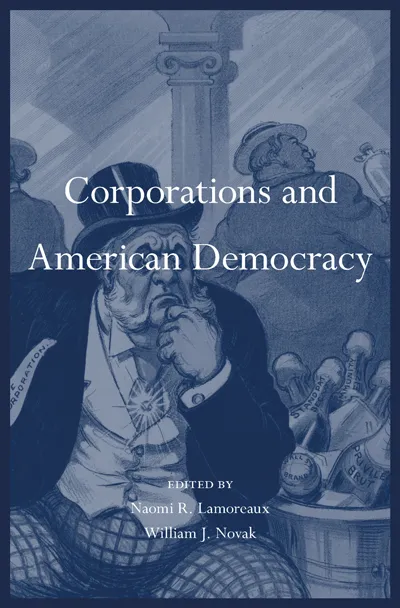
Corporations and American Democracy
(Harvard University Press, 2017)
William J. Novak, Charles F. and Edith J. Clyne Professor of Law (with Naomi R. Lamoreaux)
The U.S. Supreme Court’s decision in Citizens United v. Federal Election Commission inspired debate among academics, policymakers, and the public regarding the role of corporations in American democracy. Novak and Lamoreaux’s book offers the historical grounding lacking from those debates. Fourteen historians discuss the corporation’s place in American democracy from the Founding Era to the recent past. Detailed study of seminal moments of change and in-depth analysis make this volume critical reading for those wanting to understand how the American polity has wrestled with the possibilities and dangers of the corporate form throughout U.S. history. Using detailed exploration of the historical record, Novak and Lamoreaux examine the nation’s long and largely uninterrupted history of attempting to channel corporate power to protect and enhance democracy. The book includes an essay by Novak’s Michigan Law colleague, Daniel Crane, the Frederick Paul Furth Sr. Professor of Law: “The Dissociation of Incorporation and Regulation in the Progressive Era and the New Deal.” Crane’s essay looks at the new era of corporate regulation through the exploration of two failed efforts at federal incorporation in the early 20th century—the Hepburn Bill of 1907 and the Borah-Mahoney Bill of 1937.
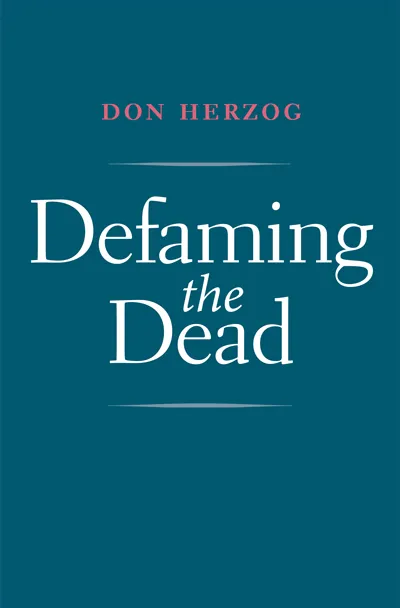
Defaming the Dead
(Yale University Press, 2017)
Don Herzog, Edson R. Sunderland Professor of Law
Can you libel or slander the dead? Herzog’s book offers a variety of possible answers through numerous lenses, and develops his theories by tackling increasingly large implications and crisscrossing the lines between law, culture, philosophy, and the meaning of life. At its core, the book provides an in-depth look at what tort law is and how it is designed to protect. It forces the reader to ask and answer the tough questions surrounding death and our values, and encourages us to think about and look at life and the law in a new light. The book’s preface also offers a shout-out to the Law School and Herzog’s legion of students:
“I’m a political theorist, not a lawyer; but I’ve been teaching at the University of Michigan Law School for over twenty-five years now. For many years, I’ve taught [the] First Amendment and torts. In 2009, I taught a seminar on defamation, which got me started thinking seriously about these issues. The Law School is a wonderful place: thanks to generations of my students and my colleagues for being so smart and savvy. I’ve quipped that I was abandoned as a foundling on the law school’s steps and they took me in and raised me. I’m delighted to dedicate this book to the institution.”––from the preface of Defaming the Dead
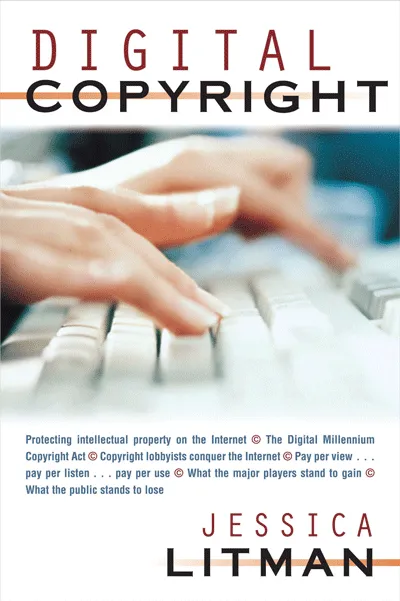
Digital Copyright
(Michigan Publishing, 2017)
Jessica Litman, John F. Nickoll Professor of Law
The Maize Books imprint of Michigan Publishing has published a new edition of Digital Copyright under a CC-BY-ND Creative Commons License. Digital Copyright charts the interaction among copyright law, politics, and emerging technology, and includes a historical exploration of efforts to revise the copyright statute to respond to the challenges posed by the Internet. The Maize Books edition includes an afterword written in 2006 exploring the rise of peer-to-peer file sharing and a new postscript reflecting on the consequences of the Digital Millennium Copyright Act as it nears its 20th birthday.
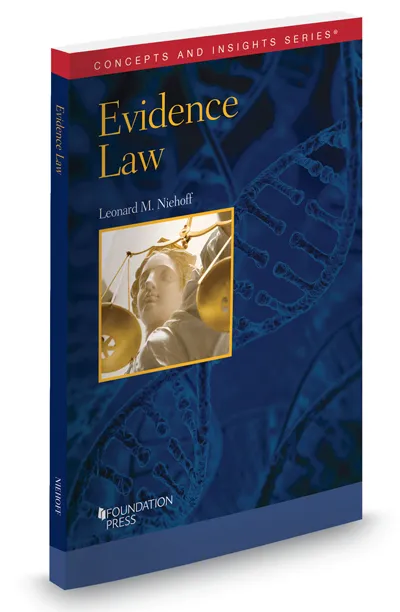
Evidence Law (Concepts and Insights)
(Foundation Press, 2016)
Leonard Niehoff, ’84, Professor from Practice
Niehoff begins by providing a framework for understanding the general theory of evidence law. Using this framework as a guide, he then leads the reader through the essential principles of evidence: relevance, character, hearsay, impeachment, opinion, privileges, and nonconventional forms of evidence. The book also provides a helpful appendix that offers practical guidance on how to find, offer, and object to evidence. Niehoff leverages his 30 years of experience as an evidence professor and a practicing litigator to provide the reader with a solid understanding of what the evidence rules are trying to achieve and how they are going about it.
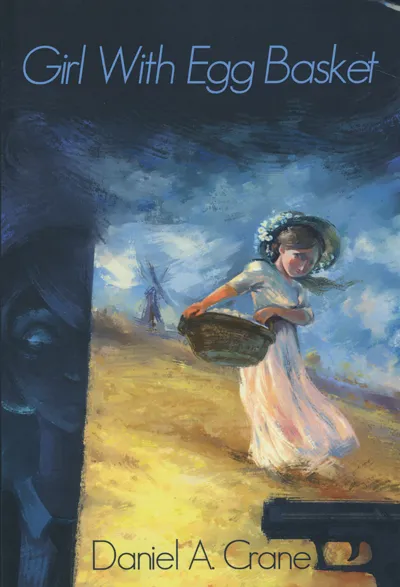
Girl With Egg Basket
(DartFrog Books, 2016)
Daniel Crane, Frederick Paul Furth Sr. Professor of Law
The sole work of fiction on our list, Girl With Egg Basket opens with a shooting by a law student at a faculty meeting. Told from the perspective of Nell Hatley, a tenure-seeking law professor, the book unfolds layer by mysterious layer. The gunfire leaves one professor dead and another wounded. Police find a slip of paper in the shooter’s pocket with three names—the two victims’ and Nell’s. When the investigation stalls, Nell picks up the trail to determine the shooter’s motive. Assisted by her lawyer boyfriend, Nell learns about a lawsuit over a Monet painting and a conspiracy of theft, fraud, and murder dating back to World War II. While Nell deals with external threats and her insecurity about her competence as a law professor, she also must confront haunting childhood memories.
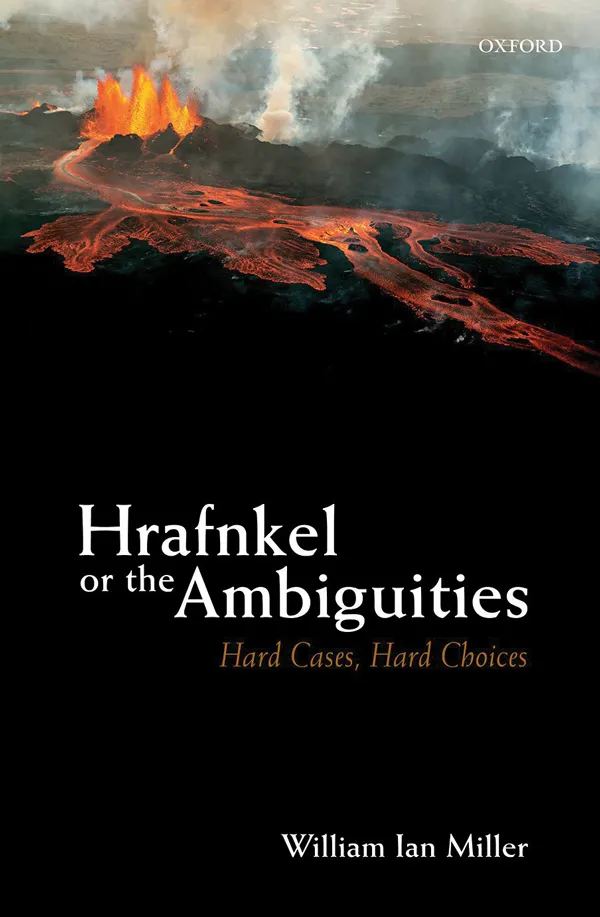
Hrafnkel or the Ambiguities: Hard Cases, Hard Choices
(Oxford University Press, 2017)
William I. Miller, Thomas G. Long Professor of Law
Legendary for his teaching of Norse sagas and bloodfeuds, Miller relates the story of a feud involving a man who rises, falls, and rises again in Hrafnkel or the Ambiguities: Hard Cases, Hard Choices. Through the telling of the feud and his story, questions emerge about the justification for defense, for causing pain or injury to another, and by what means. Miller examines how pain is experienced and measured in order for one to get back to equal. He also looks at how we are forced to price esteem, dignity, and our very lives. Miller’s account takes a very different and much deeper look at this saga than other attempts and exposes universal truths in the process. Despite its unpronounceable name, the Hrafnkels saga is one of the three or four best known sagas, and the one that has over the years garnered the most critical attention.
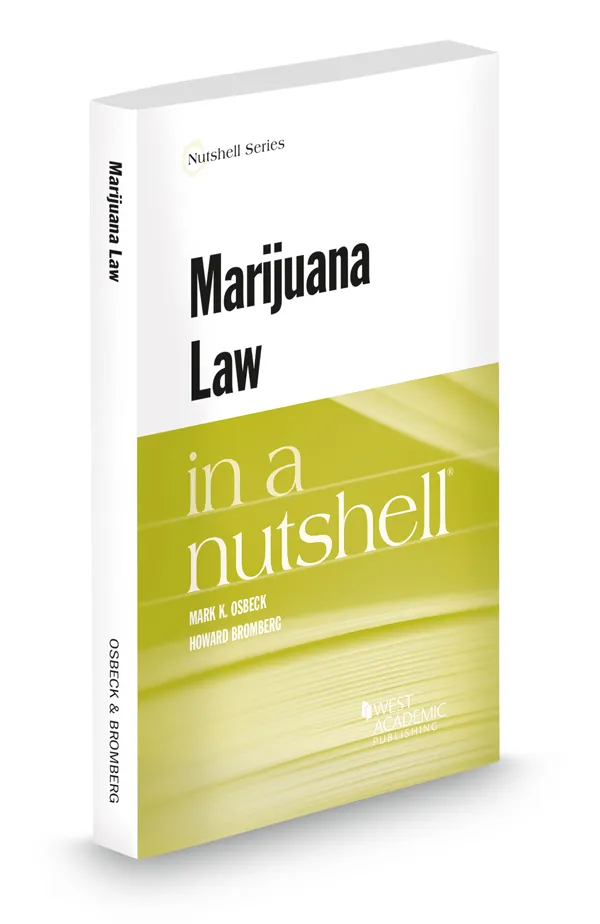
Marijuana Law in a Nutshell
(West Academic Publishing, 2017)
Mark K. Osbeck, ’86, and Howard Bromberg, Clinical Professors of Law in the Legal Practice Program
As states grapple with the legalization of marijuana, the law races to keep pace. Osbeck and Bromberg, who taught mini-seminars on the topic at Michigan Law in 2015 and 2017, address marijuana with regard to public policy, legal history, constitutional law, criminal law, and jurisprudence. They also touch on the practical side of legal issues that could arise for marijuana-related businesses and individuals in areas such as banking, employment, tax, bankruptcy, and child custody. The book provides an overview of federal laws governing marijuana, and information on international, state, and local laws. Arguments for and against marijuana use for medical and non-medical reasons round out the discourse. Osbeck and Bromberg currently are at work (with a third author) on a marijuana law casebook for West Academic Publishing, which likely will be published in fall 2018.
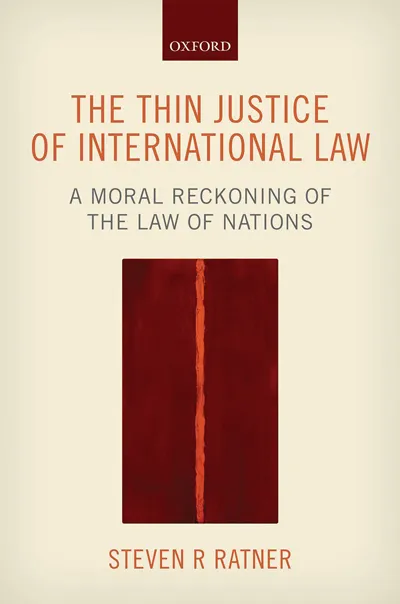
The Thin Justice of International Law: A Moral Reckoning of the Law of Nations
(Oxford University Press, 2015)
Steven R. Ratner, Bruno Simma Collegiate Professor of Law
Addressing armed conflict and human misery around the world is an international mission. For those practicing and studying international law, the limits on its effectiveness can be frustrating. Ratner’s book offers an overview of the promises and limitations of international law from the perspective of its contribution to global justice. He details the norms and institutions that help govern the behavior of states and other global actors, and then assesses whether they are just in the sense of advancing peace and human rights. This book offers a unique interdisciplinary approach to global justice by integrating the work and insights of international law and contemporary ethics.
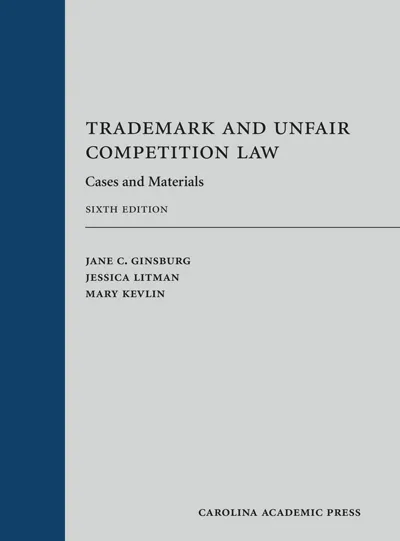
Trademark and Unfair Competition Law: Cases and Materials (6th ed.)
(Carolina Academic Press, 2017)
Jessica Litman, John F. Nickoll Professor of Law
(with Jane C. Ginsburg and Mary Kevlin)
The new edition of this leading casebook covers recent developments, such as the controversy over registration of disparaging marks (the “Slants” and “Redskins” litigations), expressive uses of trademarks, protection of famous foreign trademarks, and trademarks on the Internet. The Dilution chapter has been substantially reorganized. Throughout the chapters, Litman, Ginsburg, and Kevlin have written provocative questions and problems to stimulate classroom discussion. The current edition also contains more visual material. Of special note is that Litman and her co-authors worked hard to ensure this volume was less expensive for students than other casebooks covering the same topics.







